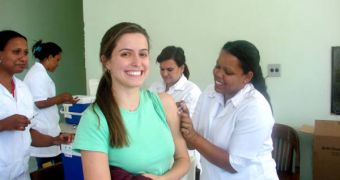Vaccines are at this point the best defense we have against a large number of pathogens, but sometimes their biggest flaw is that their molecular size prevents them from reaching secluded places inside the human body, where viruses and other small microorganisms can easily penetrate. But those “safe places” are about to be destroyed as well, as researchers from the Cornell University (CU) have devised a new molecular capsule able to carry vaccines to the most remote places. The tiny container works by sticking to its target cells, and then releasing the active ingredients.
The finds are published in the June 25th online issue of the journal Gene Therapy. According to the paper, the new method of delivery could one day be used to treat such medical conditions as cancer and immunological disorders. The molecule-sized transporters could also deliver genetic material to a place that needs it, and also inside the blood stream.
“This study greatly extends the range of therapies. We can introduce just about any drug or genetic material that can be encapsulated, and it is delivered to any circulating cells that are specifically targeted,” CU Associate Professor of Biomedical Engineering Michael King explains. He has been the co-author of the new study, together with Shenzhen University School of Medicine Assistant Professor Zhong Huang, who has been the lead author. Huang is a former CU research associate.
The small containers are made almost entirely out of lipids. They are then filled with whatever cargo is needed, and the entire mix is coated with layers of selectins. These proteins bind only to specific types of cells in the human body, which ensures that the treatment is only applied to selected locations, and not all over the body. This is a problem with chemotherapy treatments used in cancer, which attack all the cells in the body, and not just the ones that have formed tumors.
“We've found a way to disable the function of cancer cells without compromising the immune system,” King says. Additionally, the new technique could significantly reduce the number of side-effects that many existing drugs have, exactly because their actions are not focused on a single type of cells.

 14 DAY TRIAL //
14 DAY TRIAL //